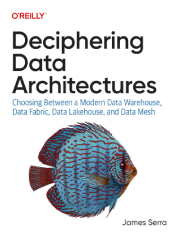
عنوان:
Deciphering Data Architectures
نویسنده:
James Serra
انتشارات:
O'Reilly Media
تاریخ انتشار:
2024
حجم:
6.72MB
معرفی کتاب:"راهنمای جامع معماریهای داده: بررسی و مقایسه Data Warehouse مدرن، Data Fabric، Data Lakehouse و Data Mesh - ویرایش اول"
کتاب Deciphering Data Architectures اثری از جیمز سرا، معمار راهکارهای Big Data و Data Warehousing در مایکروسافت، یک راهنمای کاربردی برای درک دقیق معماریهای مدرن داده است. این کتاب به مقایسه چهار رویکرد رایج در معماری دادهها شامل Data Fabric، Data Lakehouse، Data Mesh و انبار داده مدرن میپردازد.
آنچه در این کتاب خواهید آموخت
- آشنایی با مزایا و معایب هر معماری داده
- تفکیک واقعیت از اغراقهای بازاری درباره Data Mesh و دیگر معماریها
- درک تفاوتهای کلیدی بین Data Lake و Data Warehouse
- یادگیری مفاهیم اساسی معماری داده جهت ساخت راهکارهای دقیقتر
- درک بهتر روند تحول انبار داده برای همسویی با قابلیتهای Data Lake
- توانایی انتخاب بهترین معماری برای نیازهای خاص سازمانی شما
این کتاب مرجع مناسبی برای تحلیلگران داده، معماران سیستم و مدیران فناوری است که به دنبال درک عمیق و تصمیمگیری آگاهانه درباره پیادهسازی زیرساختهای داده در فضای ابری هستند. نویسنده با نگاهی عملیاتی، پیچیدگیها و چالشهای معماریهای نوین داده را شفافسازی میکند.
اگر در حال ارزیابی راهکارهایی چون Data Fabric یا Lakehouse هستید و نمیدانید برای سازمان شما چه معماری مناسبتر است، این کتاب دید روشنی درباره واقعیتهای هر رویکرد به شما خواهد داد.
فهرست مطالب
- Copyright
- Table of Contents
- Foreword
- Preface
- Part I. Foundation
- Chapter 1. Big Data
- What Is Big Data, and How Can It Help You?
- Data Maturity
- Self-Service Business Intelligence
- Summary
- Chapter 2. Types of Data Architectures
- Evolution of Data Architectures
- Relational Data Warehouse
- Data Lake
- Modern Data Warehouse
- Data Fabric
- Data Lakehouse
- Data Mesh
- Summary
- Chapter 3. The Architecture Design Session
- What Is an ADS?
- Why Hold an ADS?
- Before the ADS
- Conducting the ADS
- After the ADS
- Tips for Conducting an ADS
- Summary
- Part II. Common Data Architecture Concepts
- Chapter 4. The Relational Data Warehouse
- What Is a Relational Data Warehouse?
- What a Data Warehouse Is Not
- The Top-Down Approach
- Why Use a Relational Data Warehouse?
- Drawbacks to Using a Relational Data Warehouse
- Populating a Data Warehouse
- The Death of the Relational Data Warehouse Has Been Greatly Exaggerated
- Summary
- Chapter 5. Data Lake
- What Is a Data Lake?
- Why Use a Data Lake?
- Bottom-Up Approach
- Best Practices for Data Lake Design
- Multiple Data Lakes
- Summary
- Chapter 6. Data Storage Solutions and Processes
- Data Storage Solutions
- Data Processes
- Summary
- Chapter 7. Approaches to Design
- Online Transaction Processing Versus Online Analytical Processing
- Operational and Analytical Data
- Symmetric Multiprocessing and Massively Parallel Processing
- Lambda Architecture
- Kappa Architecture
- Polyglot Persistence and Polyglot Data Stores
- Summary
- Chapter 8. Approaches to Data Modeling
- Relational Modeling
- Dimensional Modeling
- Common Data Model
- Data Vault
- The Kimball and Inmon Data Warehousing Methodologies
- Methodology Myths
- Summary
- Chapter 9. Approaches to Data Ingestion
- ETL Versus ELT
- Reverse ETL
- Batch Processing Versus Real-Time Processing
- Data Governance
- Summary
- Part III. Data Architectures
- Chapter 10. The Modern Data Warehouse
- The MDW Architecture
- Pros and Cons of the MDW Architecture
- Combining the RDW and Data Lake
- Stepping Stones to the MDW
- Case Study: Wilson & Gunkerk’s Strategic Shift to an MDW
- Summary
- Chapter 11. Data Fabric
- The Data Fabric Architecture
- Why Transition from an MDW to a Data Fabric Architecture?
- Potential Drawbacks
- Summary
- Chapter 12. Data Lakehouse
- Delta Lake Features
- Performance Improvements
- The Data Lakehouse Architecture
- What If You Skip the Relational Data Warehouse?
- Relational Serving Layer
- Summary
- Chapter 13. Data Mesh Foundation
- A Decentralized Data Architecture
- Data Mesh Hype
- Dehghani’s Four Principles of Data Mesh
- The “Pure” Data Mesh
- Data Domains
- Data Mesh Logical Architecture
- Different Topologies
- Data Mesh Versus Data Fabric
- Use Cases
- Summary
- Chapter 14. Should You Adopt Data Mesh? Myths, Concerns, and the Future
- Myths
- Concerns
- Organizational Assessment: Should You Adopt a Data Mesh?
- Recommendations for Implementing a Successful Data Mesh
- The Future of Data Mesh
- Zooming Out: Understanding Data Architectures and Their Applications
- Summary
- Part IV. People, Processes, and Technology
- Chapter 15. People and Processes
- Team Organization: Roles and Responsibilities
- Why Projects Fail: Pitfalls and Prevention
- Tips for Success
- Summary
- Chapter 16. Technologies
- Choosing a Platform
- Cloud Service Models
- Software Frameworks
- Summary
- Index
- About the Author
- Colophon
مشخصات
نام کتاب
Deciphering Data Architectures: Choosing Between a Modern Data Warehouse, Data Fabric, Data Lakehouse, and Data Mesh Edition: 1
نویسنده
James Serra
انتشارات
O'Reilly Media
تاریخ انتشار
2024
ISBN
9781098150761
تعداد صفحات
278
زبان
انگلیسی
فرمت
حجم
6.72MB
موضوع
Computers > Databases
